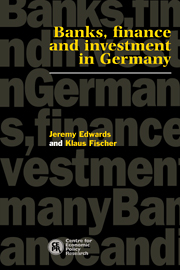Book contents
- Frontmatter
- Contents
- List of figures
- List of tables
- Preface
- 1 Introduction
- 2 A theoretical framework for analysing the effects of the financial system on economic performance
- 3 The significance of bank loans in the finance of aggregate investment in Germany
- 4 Legal forms of enterprise in Germany, and their implications for the role of the German financial system
- 5 The structure of the German banking system
- 6 Bank supervisory board representation and other aspects of German bank lending to firms
- 7 German bank behaviour when firms are in financial distress
- 8 The ownership structure of large German firms, and its implications for German banks' corporate control role
- 9 Do German banks act as delegated exercisers of equity's control rights?
- 10 Conclusion
- Bibliography
- Index
2 - A theoretical framework for analysing the effects of the financial system on economic performance
Published online by Cambridge University Press: 02 November 2009
- Frontmatter
- Contents
- List of figures
- List of tables
- Preface
- 1 Introduction
- 2 A theoretical framework for analysing the effects of the financial system on economic performance
- 3 The significance of bank loans in the finance of aggregate investment in Germany
- 4 Legal forms of enterprise in Germany, and their implications for the role of the German financial system
- 5 The structure of the German banking system
- 6 Bank supervisory board representation and other aspects of German bank lending to firms
- 7 German bank behaviour when firms are in financial distress
- 8 The ownership structure of large German firms, and its implications for German banks' corporate control role
- 9 Do German banks act as delegated exercisers of equity's control rights?
- 10 Conclusion
- Bibliography
- Index
Summary
Introduction
This chapter reviews existing theories of business finance and financial intermediation in order to provide a theoretical basis for analysing the effects of the system of finance for investment on economic performance. It is essential to have a general theoretical framework as a starting point for the assessment of the various claims that have been made about the extent to which the German economy benefits from the distinctive characteristics of the German system of investment finance. Without some idea of the functions that an economy's system of finance for investment performs, and the different circumstances in which one set of institutional arrangements within the financial system is likely to be more efficient than another, an adequate assessment of the evidence in support of these claims is not possible. The second section provides a survey of theoretical analyses of firms' financing decisions. The third section considers the role which theory suggests financial intermediaries may play in the provision of finance for investment. The fourth section examines the general implications of the theoretical discussion in the second and third sections for claims about the superiority of the German system of investment finance compared to that of the UK. The final section draws a brief conclusion.
Theoretical analysis of the financing decisions of firms
The financial system acts as a mechanism for savers to provide resources to investors who have more productive uses for them: the improvement in the allocation of resources, by comparison with the situation in which investment is entirely self-financed, can in principle make both savers and investors better off. The investors to which savers provide resources via the financial system are typically firms.
- Type
- Chapter
- Information
- Banks, Finance and Investment in Germany , pp. 22 - 48Publisher: Cambridge University PressPrint publication year: 1994



